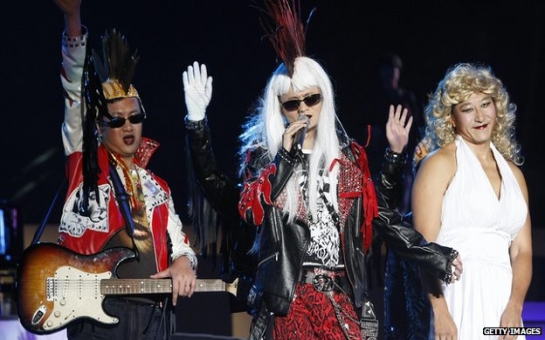The Chinese e-commerce giant, Alibaba, is expected to raise over $25bn (£15bn) in its forthcoming initial public offering. So what will it do with the money?
Will it buckle down against fierce competition at home, or will it set its sights on international rivals Amazon and eBay?
China's vast shopping malls have been quieter recently. Fewer shoppers are braving the traffic and the smog to browse the handbags, electronics, scarves and socks.
And those that do frequently cast a glance at their phones or slip on a pair of shoes, admire the fit, but take home only a mental note of the make and size.
As elsewhere, China's retail sector has undergone an e-commerce revolution.
But in China just one name dominates: Alibaba, whose sprawling web of companies has enveloped the market, accounting for more than three-quarters of all internet sales.
But that may not be enough to satisfy Jack Ma.
"In the past decade, we measured ourselves by how much we changed China. In the future, we will be judged by how much progress we bring to the world," he wrote in an open letter as he launched the company's pitch to investors.
So with an extra $25bn in his pocket will Jack Ma now go global with his peculiar brand of quirkiness and fearlessness?
Leftover treasure
Alibaba does already operate internationally. Its bewildering array of platforms means it is able to deliver anything from cheap Chinese car parts to American consumers to fresh New Zealand oysters to China's increasingly wealthy middle classes.
But so far the company has only a minimal presence within foreign markets.
Julia Zhu, the founder of Observer Solutions, a China e-commerce research and advisory firm, thinks even a $25bn war chest is unlikely to change that dramatically.
"They need those funds to continue to grow their empire in China," she says. "All that requires a lot of investment and the competition in China is fierce."
Plus the prospects in China are tantalising. Only around half of China's 1.3 billion population is online.
Marketing analysts, eMarketer, predict China's retail market will overtake the size of the US market by 2017. And the number of those shopping via computers and smartphones is increasingly rapidly.
Alibaba's newest service, online savings accounts, launched under the name Yu'E Bao or "Leftover Treasure", has proved so popular that Beijing has put a break on its growth for fear it will undermine China's traditional banks.
And Jack Ma is contemplating the potential of big data analytics.
China is clearly still rife with possibilities.
'Crocodile in the Yangtze'
Porter Erisman worked at Alibaba during its first eight years, watching as it chased rival eBay out of China in 2006.
Something Jack Ma said at the time convinced Mr Erisman that Ma would play the long game and not strike out immediately for US shores.
"EBay may be a shark in the ocean but I am a crocodile in the Yangtze," Ma said. "If we fight in the ocean, we lose, but if we fight in the river, we win."
I think Amazon and eBay... should be a bit less arrogant and a bit more worried”
Vincent Digonnet
Digital marketers Razorfish
"China is 10 years ahead in e-commerce," says Vincent Digonnet, chairman for the Asia-Pacific region at the digital marketing agency Razorfish. He thinks Western internet companies should brace themselves for a battle with a new style of e-commerce.
"In the US when you look at the design of a site it's still very much a transactional site, there's not a lot of consumer-generated content or ability to feedback.
"In China it's the opposite. It's an incredibly social place. It's a place where you discover brands, where you engage with people."
Mr Digonnet believes Jack Ma's "internet ecosystem" will eventually dominate.
"I don't think he needs cash in order to grow his position in China," he says.
"I think he'll inject it into a company in the West. I think he's got his model in his head and I think he's going to replicate his model."
Main street online
Alibaba has already established a beachhead in the American market.
This summer 11Main was launched. It is owned by Alibaba but is managed by Americans and feels like a local shopping experience.
Jack Ma has also invested in several US companies - ride-sharing service Lyft, sports merchandise site Fanatics, search engine Quixey, messaging app Tango, and mobile gaming company Kabam.
Some see these forays into the US tech sector as Alibaba's first steps in a campaign to become a global online marketplace.
Kung fu culture
Perhaps the only doubts that linger are cultural: whether the company philosophy, incorporating handstands in the office and kung fu nicknames for staff, will stand Alibaba in good stead to take on the big corporations of the West.
Jack Ma has fostered tremendous company loyalty: employees turn out en masse each Chinese New Year to watch executives perform pop songs, dressed in wigs and costumes at the annual Alifest.
And the company hosts regular mass weddings of employees, all of which has earned it a reputation as being outlandish, even cultish.
Jack Ma and other executives dressed up to perform at the tenth anniversary celebration of the company founding.
(BBC)
Bakudaily.Az











